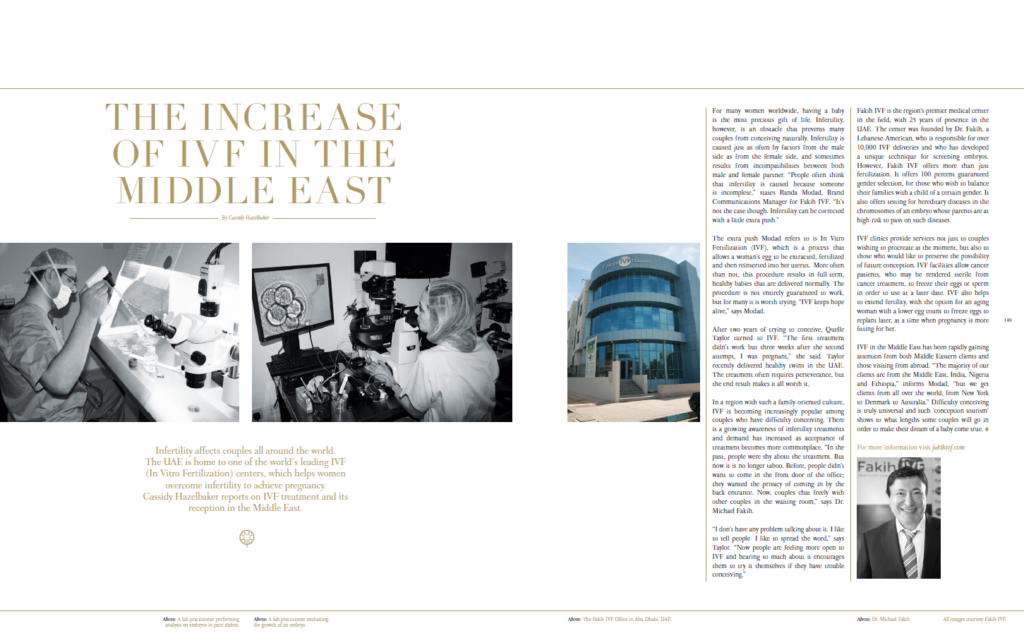The Increase of IVF in the Middle East

Infertility affects couples all around the world. The UAE is home to one of the world’s leading IVF (In Vitro Fertilization) centers, which helps women overcome infertility to achieve pregnancy. Cassidy Hazelbaker reports on IVF treatment and its reception in the Middle East.
For many women worldwide, having a baby is the most precious gift of life. Infertility, however, is an obstacle that prevents many couples from conceiving naturally. Infertility is caused just as often by factors from the male side as from the female side, and sometimes results from incompatibilities between both male and female partner. “People often think that infertility is caused because someone is incomplete,” states Randa Modad, Brand Communications Manager for Fakih IVF. “It’s not the case though. Infertility can be corrected with a little extra push.”
The extra push Modad refers to is In Vitro Fertilization (IVF), which is a process that allows a woman’s egg to be extracted, fertilized and then reinserted into her uterus. More often than not, this procedure results in full-term, healthy babies that are delivered normally. The procedure is not entirely guaranteed to work, but for many it is worth trying. “IVF keeps hope alive,” says Modad.
After two years of trying to conceive, Quelle Taylor turned to IVF. “The first treatment didn’t work but three weeks after the second attempt, I was pregnant,” she said. Taylor recently delivered healthy twins in the UAE. The treatment often requires perseverance, but the end result makes it all worth it.
In a region with such a family-oriented culture, IVF is becoming increasingly popular among couples who have difficulty conceiving. There is a growing awareness of infertility treatments and demand has increased as acceptance of treatment becomes more commonplace. “In the past, people were shy about the treatment. But now it is no longer taboo. Before, people didn’t want to come in the front door of the office; they wanted the privacy of coming in by the back entrance. Now, couples chat freely with other couples in the waiting room,” says Dr. Michael Fakih.
“I don’t have any problem talking about it. I like to tell people- I like to spread the word,” says Taylor. “Now people are feeling more open to IVF and hearing so much about it encourages them to try it themselves if they have trouble conceiving.”
Fakih IVF is the region’s premier medical center in the field, with 25 years of presence in the UAE. The center was founded by Dr. Fakih, a Lebanese-American, who is responsible for over 10,000 IVF deliveries and who has developed a unique technique for screening embryos. However, Fakih IVF offers more than just fertilization. It offers 100 percent guaranteed gender selection, for those who wish to balance their families with a child of a certain gender. It also offers testing for hereditary diseases in the chromosomes of an embryo whose parents are at high-risk to pass on such diseases.
IVF clinics provide services not just to couples wishing to procreate at the moment, but also to those who would like to preserve the possibility of future conception. IVF facilities allow cancer patients, who may be rendered sterile from cancer treatment, to freeze their eggs or sperm in order to use at a later date. IVF also helps to extend fertility, with the option for an aging woman with a lower egg count to freeze eggs to replant later, at a time when pregnancy is more fitting for her.
IVF in the Middle East has been rapidly gaining attention from both Middle Eastern clients and those visiting from abroad. “The majority of our clients are from the Middle East, India, Nigeria and Ethiopia,” informs Modad, “but we get clients from all over the world, from New York to Denmark to Australia.” Difficulty conceiving is truly universal and such ‘conception tourism’ shows to what lengths some couples will go in order to make their dream of a baby come true.